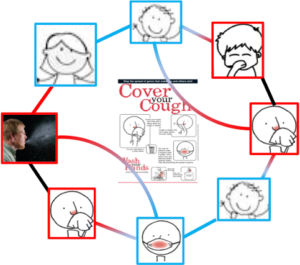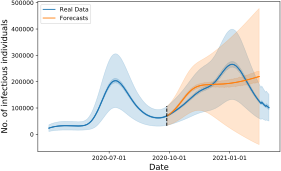 Epidemic diseases often spread via a form of contact among individuals. The existing web of interactions among the humans in a population determines the contact network over which the disease dynamics propagate. When a disease breaks out in the population, people that become aware of the disease can take precautionary measures to reduce their risk of getting infected. These measures are behavioral responses that depend on the local information of the individual on its risk of infection. In return, these responses affect the spread of the disease by changing the underlying contact rate among the individuals. In this project, we propose individual behavior response models to the disease prevalence in the population. We consider a model where individuals distance themselves from their local contacts based on their awareness. An individual forms its awareness based on information from its contacts in the social network. The efficacy of their distancing depends on the “amount of overlap” between their contagion network and their social network [Paarporn et al 2017]. We also consider a game theoretic basis for understanding the rational response of healthy and sick individuals over a network. The starting point for our model is the recognition that healthy individuals are concerned about contracting a disease from their sick contacts and may utilize protective measures. In addition, sick individuals may be concerned with spreading the disease to their healthy contacts and adopt preemptive measures [Eksin et al 2017]. Yet, in practice both protective and preemptive changes in behavior come with costs. We show using analytical derivations and simulations that the empathy of sick individuals is more important than the risk aversion of healthy individuals in eliminating the disease. More broadly, we hope that the current framework enables a deeper integration of game theory into studies of how behavior is shaped by and shapes disease dynamics. Overall, this research thrust points to potential pitfalls in current state-of-the-art disease forecasting models that neglect change of behavior during disease outbreaks, and to potential opportunities in local interventions.
Epidemic diseases often spread via a form of contact among individuals. The existing web of interactions among the humans in a population determines the contact network over which the disease dynamics propagate. When a disease breaks out in the population, people that become aware of the disease can take precautionary measures to reduce their risk of getting infected. These measures are behavioral responses that depend on the local information of the individual on its risk of infection. In return, these responses affect the spread of the disease by changing the underlying contact rate among the individuals. In this project, we propose individual behavior response models to the disease prevalence in the population. We consider a model where individuals distance themselves from their local contacts based on their awareness. An individual forms its awareness based on information from its contacts in the social network. The efficacy of their distancing depends on the “amount of overlap” between their contagion network and their social network [Paarporn et al 2017]. We also consider a game theoretic basis for understanding the rational response of healthy and sick individuals over a network. The starting point for our model is the recognition that healthy individuals are concerned about contracting a disease from their sick contacts and may utilize protective measures. In addition, sick individuals may be concerned with spreading the disease to their healthy contacts and adopt preemptive measures [Eksin et al 2017]. Yet, in practice both protective and preemptive changes in behavior come with costs. We show using analytical derivations and simulations that the empathy of sick individuals is more important than the risk aversion of healthy individuals in eliminating the disease. More broadly, we hope that the current framework enables a deeper integration of game theory into studies of how behavior is shaped by and shapes disease dynamics. Overall, this research thrust points to potential pitfalls in current state-of-the-art disease forecasting models that neglect change of behavior during disease outbreaks, and to potential opportunities in local interventions.
 Since COVID-19, this research thread has evolved to consider awareness and behavior driven models at the locality and individual levels showcasing the rich set of disease behaviors that can arise as a result [Khazaei et al 2021, Eksin et al 2021, Weitz et al 2020, Eksin et al 2019].
Since COVID-19, this research thread has evolved to consider awareness and behavior driven models at the locality and individual levels showcasing the rich set of disease behaviors that can arise as a result [Khazaei et al 2021, Eksin et al 2021, Weitz et al 2020, Eksin et al 2019].
Collaborators and References
I am grateful to the invaluable support and help from Keith Paarporn (U of Colorado), Joshua Weitz (Georgia Tech) and Jeff Shamma (UIUC) in this thread. I also had the pleasure to work with wonderful collaborators such as J. Dushoff (McMaster), S.W. Park (Princeton), and M. Ndeffo-Mbah (A&M).
